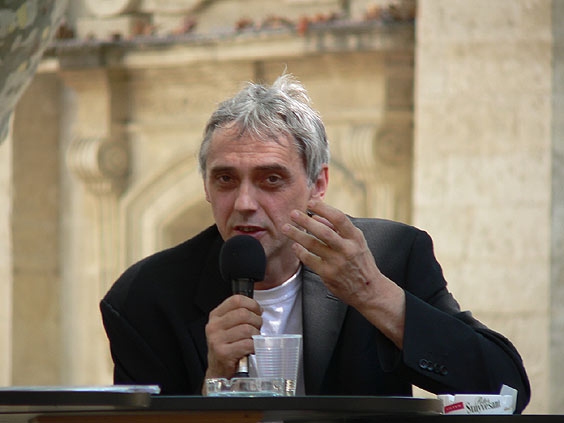BIOGRAPHY:

Nadj Josef
Choreographer
born in 1957 in Kanjiza, a province of Vojvodina in the former Yugoslavia, in what is today Serbia.
Beginning in childhood, he drew, practiced wrestling, accordeon, soccer and chess, intending a career in painting.
Between the ages of 15 and 18, he studied at the fine arts high school of Novi Sad (the capital of Vojvodina), followed by 15 months of military service in Bosnia and Herzegovina.
Afterwards, he left to study art history and music at the Academy of Fine Arts and at the University of Budapest, where he also began studying physical expression and acting.
In 1980, he left for Paris to continue his training with Marcel Marceau and Etienne Decroux. Simultaneously he discovered modern dance, at the time in a period of swift expansion in France. He followed the teachings of Larri Leong (who combined dance, kimomichi and aidido) and Yves Cassati, also taking classes in tai-chi, butoh and contact improvisation (with Mark Tompkins), began himself to teach the movement arts in 1983 (in France and Hungry), and participated as a performer in works by Sidonie Rochon (Papier froissé, 1984), Mark Tompkins (Trahison Men, 1985), Catherine Diverrès (l’Arbitre des élégances, 1988) and François Verret (Illusion comique and La, commissioned by the GRCOP, 1986).
In 1986 he founded his company, Théâtre JEL – “jel” meaning “sign” in Hungarian – and created his first work, Canard Pékinois, presented in 1987 at the Théâtre de la Bastille and remounted the following year at the Théâtre de la Ville in Paris.
In 1982, Josef Nadj completely abandoned drawing and painting to dedicate himself fully to dance, and would not begin showing his work again until fifteen years later. But in 1989 he began practicing photography, pursuing it without interruption to the present.
In November 1996 he returned to exhibiting, first with his “Installations”, a series of sculptures centred upon the concept of time, executed in extension to the creation of his stage work Commentaires d’Habacuc; then in 2000, “Miniatures”, a cycle of India ink drawings inspired, like Les Philosophes, from the works of Bruno Schulz; and finally, since 2003 exhibiting his photography in several one man shows.
In 2006, Josef Nadj was Associated Artist for the 60th Festival of Avignon, presenting Asobu as the festival’s opening performance in the Court of Honour of the Palais des Papes, as well as Paso doble at the Celestins Church.
Since 1995, Josef Nadj has been the director of the Centre Chorégraphique National d’Orléans.
Involved in György Szabados "Body of Work":
Dance-Opera: The Governor’s Death (A kormányzó halála)
Production: Commissioned by the Quartz de Brest, Theatre de la Ville-Paris, L’hippodrome-Douai, Centre de Production Choregraphique-Orleans. Graceau concours de la Fondation Beaumarchais, with the participation of AlphaFnac.
Coproduction: Le Quartz Scene Nationale de Brest, Theatre dela Ville (Paris), L’Hippodrome (Douai) , Centre Choreographigue National d’Orleans
Company: Theatre Jel
Choreography and stage setting: Josef Nadj
Dance: Joszef Sarvari (the Emperor) – Denes Debrei (the Madman) – Marie-HeldneMortureux (the little Saint) – Gyork Szakonyi (the Doctor) – Laszlo Hudi (the Magician) – Kathleen Reynolds, Cecile Thidblemont (the Women) – Josef Nadj, Freddric Lescure (the Servants, the Philosophers).
Stage design/Scenography: Goury
Costumes: Catherine Rigault
Masks: Jean-Marie Binoche
Lighting Design: Remi Nicolas assisted by Sylvie Vautrin
Poet: Gyula Kodolanyi – book
Original Music by the Hungarian composer: György Szabados, interpreted on stage by the eleven musicians of the ensemble Makuz of Budapest.
Music: György Szabados with MAKUZ Orchestra
Tamás Kiss “Kobzos” (vocals), Grencsó István (sax, flute,clarinet), Dresch Mihály (sax, flute, bass clarinet), Vaskó Zsolt (flute, piccolo), Kovács Ferenc (trumpet), Mákó Miklós (trumpet), Benkő Róbert (bass), Lőrinczky Attila (bass), Geröly Tamás (percussion), Baló István (percussion), Szabados Gyorgy (piano).
Sound Direction: Pierre Jacquot
![]() Programm info
Programm info
György Szabados Trio and members of the Theatre JEL
LIST OF WORKS:
Choreographies
- 1987 premiere of his first piece Canard Pékinois
- 1988 7 peaux de rhinocéros
- 1989 La mort de l’empereur
- 1990 Comedia tempio
- 1992 Les échelles d’Orphée
- 1994 Woyzeck
- 1995 L’Anatomie du fauve
- 1996 Le cri du caméléon for the “Centre National des Arts du Cirque” (National Center for the Arts of the Circus) Les commentaires d’Habacuc , and the reworking of a new version of Woyzeck
- 1997 Le vent dans le sac
- 1999 within the context of “Le vif du sujet” at the Festival d’Avignon, Josef Nadj created a duet with Dominique Mercy, Petit psaume du matin, Les veilleurs and Le temps du repli
- 2001 Les philosophes and Petit psaume du matin
- 2002 Journal d’un inconnu
- 2003 Il n’y a plus de firmament (commissioned by the theatre Vidy-Lausanne E.T.E.)
- 2004 Poussière de soleils
- 2005 Last landscape
- 2006 Asobu and Paso doble
- 2006 New version of Last landscape : Paysage après l’orage
- 2008 Entracte
Sho-bo-gen-zo - 2009 Etc., etc.
- 2009/2010 Les Corbeaux
- 2010 Cherry-Brandy
- 2012 ATEM the breath
- 2013 Ozoon
- 2014 Paysage inconnu
- 2016 Kazan Flux Orchestra (in preparation)
Honors
In 2002, Josef Nadj is Chevalier dans l’Ordre des Arts et des Lettres for the contribution of his works to the influence of the arts in France and accross the globe.
In 2005, the Association Française d’Action Artistique of the French Ministry of European and Foreign Affairs awarded him its “Artistic Creator Without Borders Passport”, honouring the international dimension of his work and in recognition of his pieces and the importance of their circulation beyond French borders.
Choreography prize by the Société des Auteurs, Compositeurs Dramatiques for his work.
VIIIe « Prix Europa / Nouvelles Réalités Théâtrales » – awarded on June 2006 in Turin (Italy), for his work.
« Artiste émérite » prize – NEMZETI ERÖFORRÀS MINISZTERIUM – ERDEMES MÜVESZ – awarded on the 15th March, 2011 in Budapest (Hungary)
In 2011, Josef Nadj was promoted to Officier de l’ordre des Arts et des Lettres
Corrections and additions are welcome – please contact webmaster: info@györgy-szabados.com